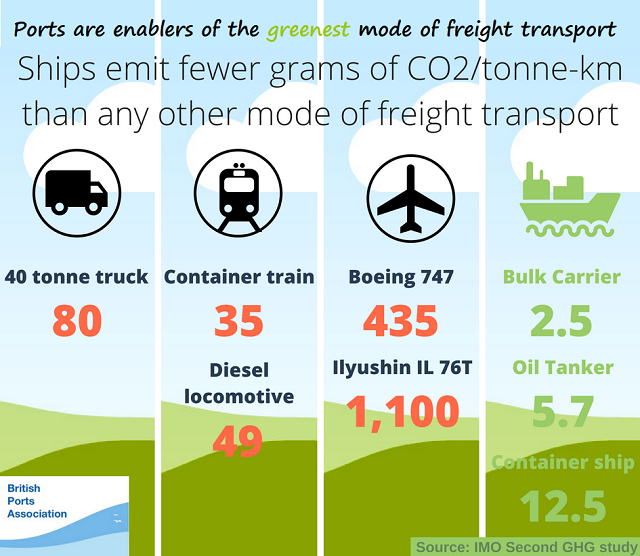British Ports Disappointed with Government Strategy
The British Ports Association has responded to the Government’s Clean Air Strategy which was published this week and includes requirements for all major ports in England to develop air quality plans within the next year.
Mark Simmonds, Policy Manager at the British Ports Association, said: “Ports and shipping are part of the solution, not the problem, and it is disappointing that the Government has missed the opportunity to promote shipping as the cleanest way to move freight.
“Ports handle 95 percent of the U.K.’s trade and moving freight by sea is still by far the most environmentally-friendly way to facilitate global trade – as well as ensuring our economy continues to function and our food and energy supplies are secure. In comparison with other transport modes shipping is an efficient and environmentally sustainable option. Utilizing the U.K.’s hundreds of ports in supporting more coastal shipping has the potential to take thousands of lorries off of U.K. roads.
“The industry is keen to play its part and work with Government on improving air quality, but this must be done holistically and using credible evidence.”
The strategy states that “by May 2019, all major English ports should produce Air Quality Strategies setting out their plans to reduce emissions across the port estate including ship and shore activities. These plans will be reviewed periodically to establish if the measures implemented are effective or further government action is required.”
Commenting specifically on Port Air Quality Plans, he said: “This is a tight deadline, but many major ports will already be taking action on air quality, monitoring the sources or producing plans of action. We are pleased that Government has recognized that there is not a one-size-fits-all solution to this. Measuring the sources of emissions is always difficult and Government should recognize that ports are often centers of major industry and logistics chains and do not usually have direct control over nearby emissions sources.”
The BPA is disappointed that the strategy provides no evidence for its claim that “international shipping emissions have a significant impact on air quality in the U.K. due to shipping lanes and engine operation while at U.K. ports. The organization has been engaging with Government on air quality for some time but have still yet to see much credible evidence set in proper context. Rather, the Government has based some of their assumptions on shipping and port emissions on reports where the methodology has significant limitations, such as substantial guesswork around vessels’ fuel type and sulfur content and assumptions on vessels’ engines. There are also significant question marks around source apportionment in emission monitoring, says the BPA.
The Government's Clean Air Strategy states that air pollution is the top environmental risk to human health in the U.K., and the fourth greatest threat to public health after cancer, heart disease
and obesity.
The Strategy makes the following shipping-related commitments:
• By March 2019, the government will consult on options for new domestic regulations to reduce pollutant emissions from domestic ships. This could be through the application of international emission standards.
• By March 2019 - the government will consult on options for extending the current Emissions Control Areas (ECAs) in U.K. waters.
• By May 2019, all major English ports should produce Air Quality Strategies setting out their plans to reduce emissions across the port estate including ship and shore activities. These plans will be reviewed periodically to establish if the measures implemented are effective or further government action is required.
• By summer 2018, the government will introduce a new government- led Clean Maritime Council to bring together different parts of the maritime sector to drive uptake of cleaner technologies and greener fuels.

